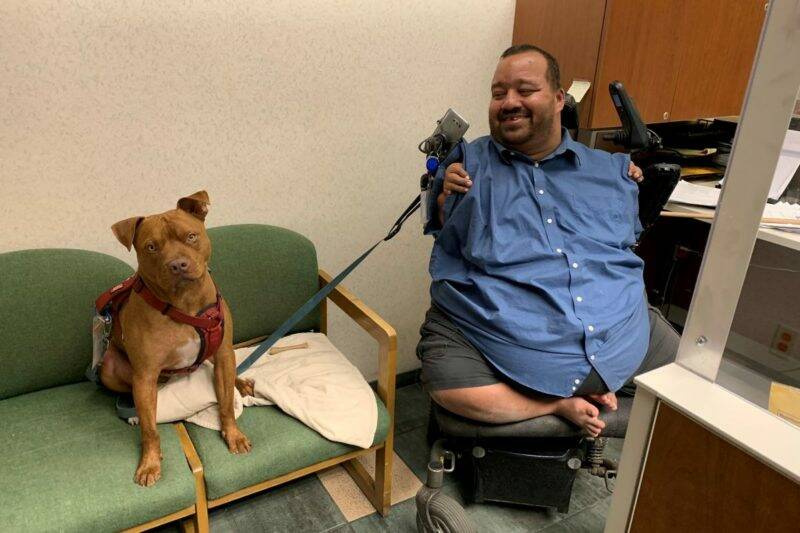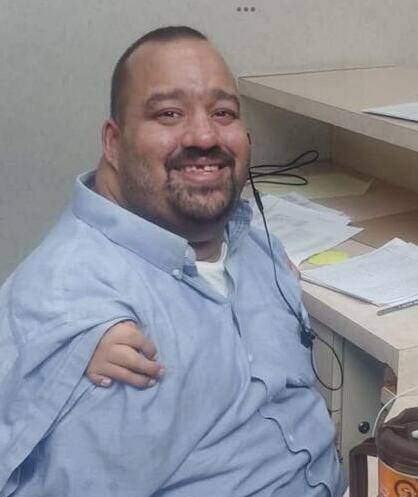Las Vegas disability advocate with rare disorder remembered as ‘amazing man’
Sandy Fletcher has been heartbroken and overwhelmed since the death of her son, who had become known in recent years as an advocate for those with disabilities in Las Vegas.
Raymond Fletcher III, born with a rare condition that made his limbs much smaller than normal, died Aug. 5 in Las Vegas. He was 48.
“He was an amazing man,” said Fletcher, 69. “Many people born the way he was born only live for a few months. He pushed through everything, rather than just whine and complain.”
Fletcher, who used a wheelchair and worked as a transit quality assurance specialist in the Regional Transportation Commission’s transit mobility department, came to Las Vegas from Indiana in 2013, his mother said, because he figured it would be easier to get around in a warm climate where snow was not a factor.
Before working for RTC, he once went to a local television news station to accuse the commission of discrimination because, he said, he often was not able to board RTC buses on his wheelchair.
But questions about what happened after Raymond Fletcher’s death have also added to Sandy Fletcher’s grief. Because Raymond Fletcher’s body was taken to McDermott’s Funeral Home and Cremation Services, Sandy Fletcher said, she said she has more questions than answers about how Raymond’s body was stored, and she wondered if her son’s body was mishandled.
McDermott’s was the Las Vegas funeral home that was shut down this summer after a regulatory body found that it was failing to cremate bodies for extended periods and failing to file death records in a timely manner.
One family told the Las Vegas Review-Journal they arranged for an open casket funeral for their loved one at the funeral home, but they later learned its license was revoked in August and that an open casket would be impossible due to the body’s condition. A lawsuit filed in September by a man alleged that McDermott’s failed to cremate his wife’s body in a timely manner.
Fighting through barriers
Asked what she would remember about Fletcher, the CEO of the Regional Transportation Commission said it was his commitment to being independent.
“Raymond was fiercely independent,” said M.J. Maynard-Carey. “Unless you ever met Raymond, it would be hard to understand how profoundly disabled he was and what being independent meant for him. He was such a great guy.”
Fletcher was perhaps best known in the Las Vegas Valley for his desire to work through his disability, phocomelia. According to the National Library of Medicine website, phocomelia is a rare genetic disorder that is characterized by the hands or feet being directly attached to the body’s trunk.
In Fletcher’s case, it meant his hands were tiny and that he didn’t have kneecaps in his legs. He became a regular user of RTC’s bus system after he moved to Las Vegas and would often show up to RTC board meetings.
Maynard-Carey said she got to know Fletcher because he went to the RTC’s leadership with suggestions to make bus travel easier for those with disabilities.
“Raymond wanted to move in the world like everyone else,” Maynard-Carey said. “He initially was a bus rider who called us a few times about some complaints. I ended up eventually meeting with him in person. I remember he was very feisty, but very fact-based. I was so impressed.”
Eventually, Fletcher became a regular at RTC public meetings. He even developed a relationship with former Las Vegas Mayor Carolyn Goodman, often texting with Goodman, who remembered him fondly.
“Raymond was a smart, well-read commonsense individual,” Goodman said. “He would often speak at board meetings or City Council meetings, and I was so impressed with how he could rise to the top of a concept and handle it impartially. He was a good man. He had goodness in his soul.”
Maynard-Carey said Fletcher’s advocacy made the RTC better as an organization.
“Mayor Goodman and myself, we came to know Raymond as an advocate for folks who maybe didn’t have the chance to speak up,” Maynard-Carey said. “He was able to connect with people, whether or not they were disabled.”
Disabilities advocate
In 2018, Fletcher, who also had worked as a long-term substitute teacher for the Clark County School District, was featured in a TEDx Talk at UNLV. During the 12-minute presentation, Fletcher talked openly about his struggles growing up and how he was able to overcome prejudices and, at times, abuses he faced.
Those who knew Fletcher also knew his dog, Hercules, his constant companion.
“In life, society puts these labels on us,” Fletcher said during the TEDx Talk. “Our parents don’t label us. I’m of mixed-race background, but I don’t consider myself a black man, a white man or a disabled man. I consider myself a man. Why should we look at somebody for the challenges or differences that they have?”
A native of Hammond, Indiana, just southeast of Chicago, Fletcher was inspired to become an advocate for those with disabilities after being turned down for a job at a men’s clothing store as a 16-year-old. The explanation why he was turned away just did not make sense to him.
“They said I couldn’t have the job because I couldn’t climb a ladder,” he said in the TEDx Talk. “As if that’s the only part of the job — what, was I going to be climbing ladders all day? Is nobody coming in to buy any clothes? It was ridiculous.”
Heartbroken mother
Back in Hammond, Sandy Fletcher said she was disturbed to learn his body was one of over 100 that had been stored at McDermott’s.
She said, following Raymond’s death, she was told by someone from the ICU unit at MountainView Hospital that his body would be taken to McDermott’s. Fletcher said she learned her son’s body was likely no longer at McDermott’s through media reports about the funeral home being shut down.
The Review-Journal’s attempts to reach former McDermott’s owner Chris Grant were unsuccessful.
A MountainView Hospital spokesperson cited patient privacy laws in saying that the hospital could not confirm or deny that Fletcher was a patient there.
In August, the Clark County coroner’s office said nearly 150 bodies were recovered from McDermott’s and moved to Davis Funeral Home in Las Vegas. Sandy Fletcher said her son’s body was among those moved.
Efforts to reach Davis Funeral Home for comment before publication of this story were unsuccessful.
In an email, Nevada Funeral & Cemetery Services Board Executive Director Stephanie Bryant McGee cited state records laws in saying that she couldn’t “provide information regarding a decedent.”
Raymond Fletcher’s body was flown back to Indiana for his visitation and service Aug. 18 at Kuiper Funeral Home in Hammond.
A sudden death
Maynard-Carey said it was not unusual for Raymond Fletcher to have to deal with health complications due to his condition, but that it was surprising how sudden his death was.
In July, Fletcher did not show up for work. Eventually one of Fletcher’s friends notified the commission that he was sick.
“We found out how serious it was, though we thought he was coming around at one point,” Maynard-Carey said. “He was a good man. He was a walking reminder that not everybody gets up every morning with the ability to move in the community. Many of us take that for granted. Raymond inspired us and inspired many of the customers and people he worked with.”
Fletcher said what she believed happened after his death has haunted her, though she’s heartened to know that he made a difference in the world.
“I’m so proud of my son,” Fletcher said. “He was an amazing man.”
Contact Bryan Horwath at bhorwath@reviewjournal.com. Follow @BryanHorwath on X.





















